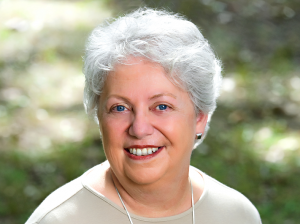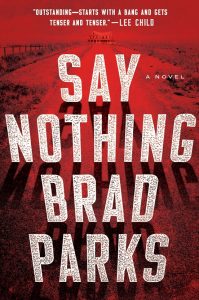Karen Dionne is a member of the International Thriller Writers, where she has served on the board of directors. She has been honored by the Michigan Humanities Council as a Humanities Scholar.
The Marsh King’s Daughter features Helena Pelletier who has a loving husband and two young daughters. The family lives on Michigan’s Upper Peninsula.
Helena has a dark secret: she’s the product of an abduction. Her mother was abducted as a teenager, and Helen is a result of that event. She and her mother lived for the first twelve years of Helena’s life in the company of the kidnapper—Helena’s father—until he was captured and sent to prison.
When a prison inmate kills two guards and escapes from prison, Helena’s past threatens to return, and only she possesses the skills to hunt her father down—ones her father taught her.
The very first lines of the novel are compelling. “If I told you my mother’s name, you’d recognize it right away. My mother was famous, though she never wanted to be. Hers wasn’t the kind of fame anyone would wish for. Jaycee Dugard, Amanda Berry, Elizabeth Smart—that kind of thing, though my mother was none of them.” How did the idea for this novel come to you?
I woke up in the middle of the night with those sentences fully formed in my head. I wasn’t dreaming about the character, although I was looking for a back story about a character in another novel. I was in that dream state where you can’t get out of bed and write it down, so I repeated it enough times so I’d remember it I in the morning.
I wrote a few paragraphs which became the first section of the novel.
Once those first few pages were written, by what process did the novel come into being?
As I wrote those paragraphs that morning, I almost gave the book an urban setting. I was thinking about the women in Cleveland who were hidden in plain sight. But at the last minute, I changed the setting to a cabin on a ridge, surrounded by swamp in Michigan’s Upper Peninsula. The reason I chose that setting was I wanted to make the book different; and, my husband and I homesteaded in Michigan’s Upper Peninsula in the 1970s with our infant daughter. I know that area very well.
In the following days, the character kept talking to me, and I kept writing little snippets in her voice—such as her imagining what it was like for her mother to give birth in the cabin. I finally decided to find a story for her. I went to my childhood book of fairy tales because I always loved fairy tales—the darker, the better.
You’ve anticipated my next question which is: the novel takes its title from a Hans Christian Anderson fable. Tell us about that.
I also like modern stories that have fairy tales as the bones of the story. I paged through my book of fairy tales, and when I found Hans Christian Anderson’s The Marsh King’s Daughter, it gave me chills. Everything in that fairy tale dovetailed beautifully with the story I was starting to tell. The daughter in the fairy tale is the child of an innocent and a monster—she has a dual nature, which I envisioned for my character.
Using one of the main story threads in the fairy tale that resulted in the redemption of that character, I structured my story to determine what would happen with Helena. I named her Helena because in the fairy tale, the character’s name is Helga.
Not only did the character of the fairy tale mesh with my story, but the fairy tale was set in a northern Viking marsh.
It was astonishing. I knew I was on to something, and it just developed from there.
You paint a compelling picture of Helena’s life (and her mother’s) while being held for years by her father. She has a complicated relationship with him. Some would call this a Stockholm Syndrome. Will you talk about that?
I don’t consider Helena’s relationship with her father to be a Stockholm Syndrome. I think her relationship with her father is a lot more complicated than that. In many ways, it’s the same as any child’s relationship with a parent. When we’re small, we don’t judge our parents as good, bad, moral, or evil. We love them because they’re our parents. I’ve always been fascinated by people who survived a far less than perfect childhood and made something good out of themselves. I see Helena as an extreme example of this. Her situation was very stark—there was no one other than her mother and father. At the beginning, she loves him unconditionally, but he’s manipulating her. But her attitude toward him changes over time. I won’t say anymore because I don’t want to spoil the book for readers.
In some ways, The Marsh King’s Daughter and its descriptions of the wilderness remind me of Jack London’s writing. Tell us about that.
I lived in Michigan’s Upper Peninsula for thirty years. Like Helena, I love wild places. I feel very much at ease with nature. I wanted to convey my love of the wilderness to readers. I really feel the book is partly my love letter to the Upper Peninsula.
The novel is replete with psychological suspense. Did you intend it to be a suspense story?
When I started writing the novel, I didn’t know what I would write. As I said, the character came to me and I started writing down her story. I wasn’t sure if it would be a thriller or literary fiction. I think it helped to enhance the book because I didn’t slot it into any particular mold. I was just writing Helena’s story in the most compelling way I could. And it turns out that there’s a strong psychological component to the book.
Your prose is quite lyrical and yet, crisp. Who are your literary influences?
I enjoy reading books that have won Pulitzer Prizes, National Book Awards, and Booker Prizes. I want my prose to be of good quality. I try to reach up. But I also admire the writing of Lee Child in his Jack Reacher series. It’s very spare. He told me he deliberately writes at a fourth-grade level because he wants to reach as wide an audience as possible. I admire the way he can write a simple sentence and include just one descriptor or one adjective or adverb and it’s perfect for hitting that note. So, I like making my prose a combination of the two—elevated but very accessible.
What’s your writing day like?
I write all day long. I start at about five a.m. My best work is done in the early morning. I hit a lull in the mid-afternoon and write again in the evenings.
If you could have dinner with any five people, real or fictional, living or dead, who would they be?
They would be the kind of people who’ve accomplished something elevated or who have taken a stand in life. Martin Luther King comes to mind. So do Gandhi and Jesus. I’d add Bill Gates because of his philanthropy and also, Jimmy Carter.
What’s coming next from Karen Dionne?
I’m writing another standalone novel that’s also set in the Upper Peninsula. It’s psychological suspense and will also have a fairy tale element.
Congratulations on penning The Marsh King’s Daughter, a superbly written and mesmerizing novel that’s been praised by the likes of David Morrell, Lee Child, Megan Abbot, Karin Slaughter, and many others.






